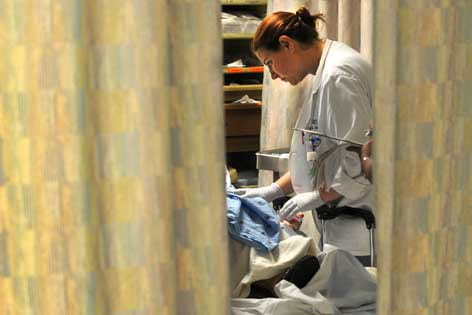Medical student reflects UCI values
Medical student’s sensitivity and respect for patients reflects spirit of UC Irvine’s Living Our Values award.

This week, Chancellor Michael Drake is announcing the 2009 Living Our Values Award winners – the staff, faculty and students whose actions best embody UC Irvine’s ideals of respect, intellectual curiosity, integrity, commitment, empathy, appreciation and fun.
Jamie Akiva Kahn, one of 14 recipients of last year’s student team award, hopes to reflect these qualities long after she leaves the university. She is senior adviser for UCI’s Emergency Medicine Interest Group, whose members were recognized in 2008 for their efforts to promote education, community outreach and careers in emergency medicine.
“I believe emergency medicine has the most impact on people,” says Kahn, now in her fifth year of UCI’s M.D./M.B.A. program. “The patients who come to the ER have so many needs, and there are just not enough doctors to help them.”
According to the American College of Surgeons, there is a growing shortage of critical care physicians. It’s urgent that more medical students, like Kahn, commit to that specialty.
As the backbone of Orange County’s emergency medicine system, UC Irvine Medical Center exposes such students to a wide range of emergency cases alongside some of the state’s top ER physicians. Rotations include training in procedures and use of emergency ultrasound, as well as shifts in the ER.
“We want them to deal directly with patients,” says Dr. Kristi Koenig, professor of clinical emergency medicine and director of public health preparedness. “When I see patients with interesting or unusual conditions, I’ll grab students and ask them to observe and tell me what they think.”
Kahn’s responsibilities on a recent Saturday night rotation in the ER included starting charts on patients and discerning why they were there. Part detective, part psychologist and part physician, she must determine not just the extent and possible cause of a patient’s injuries but also whether he or she might face additional harm after leaving.
“You have to be sensitive and show each patient respect,” she says. “They come here vulnerable and expecting our full attention.”
In addition, medical students like Kahn are expected to inform the chief resident or attending doctor of their assessment and advise further action: Does the patient require a psychological or neurological consult? Should the county Social Services Agency be contacted? The attending physician makes the final decision, but the exchange is integral to the student’s medical education.
“Akiva is very dedicated to her patients and committed to emergency care,” Koenig says, noting the importance of that first contact with ER visitors. “She has an excellent rapport with patients, and that will serve her well in her medical career.”